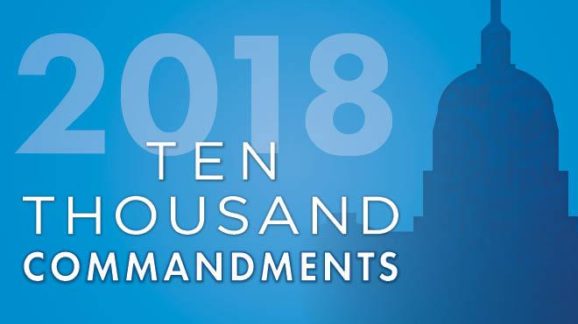‘10,000 Commandments’ in the News

The 25th anniversary edition of the Competitive Enterprise Institute’s regulatory reform study “10,000 Commandments” has received a warm welcome since it was released late last month. Study author Wayne Crews and Adjunct Analyst Ryan Young collaborated on an op-ed for USA Today, in which they emphasized the need for congressional action to bolster existing executive branch efforts:
In 2017, federal regulators issued the lowest number of final rules — 3,281 — since the National Archives began publishing these numbers in 1976. But the important question for Americans is: Will it last?
The answer is: only if Congress helps out. Despite a number of executive orders, if you look at the long-term outlook, federal agencies already have a slew of regulations planned that could reverse Trump’s early progress. To prevent erasing gains made thus far, Congress needs to give Trump’s reforms legislative teeth before his affinities for protectionism and antitrust get in the way, and before the next administration reverses course with the stroke of a pen.
The release also scored a nice mention from Boston Globe columnist Jeff Jacoby under the title “Obama threw the regulatory engine into overdrive. Trump is slowing it down.”
Within days of his inauguration, [Trump] signed an executive order directing federal agencies to cut two existing regulations for every new regulation they issue.
Fourteen months later, according to the Competitive Enterprise Institute, a Washington think tank, Trump can legitimately take credit for having slowed the regulatory juggernaut. In “Ten Thousand Commandments,” its annual report on the scope and cost of federal regulations, the Institute credits the current administration with “the most aggressive effort at regulatory reform in over a quarter century.” To be sure, it hasn’t scrapped anywhere near 70 percent of all regulations — that was the usual Trumpian hyperbole — but it has, in the report’s words, “slowed the momentum of the Obama years and implemented policies to incentivize further restraint.”
The investment experts at ETF Trends also highlighted the release, homing in on the question of balance of powers and delegation of lawmaking authority from Congress to the executive agencies:
At this time of year, when everyone is keenly focused on the taxes that they are paying, it is interesting to note that the regulatory costs identified by CEI are equivalent to all of the estimated $1.88 Trillion the IRS collected in both individual and corporate income taxes in 2017.
[…]
Much to our chagrin, however, is the fact that Congress delegates way too much power to unelected agency personnel to do the very job they are sent to Washington to do themselves. Regulatory agencies don’t answer to voters, yet they are the ones who are writing the laws, as Congress seems unwilling to take responsibility for the lawmaking themselves. We believe the recent vote on the 2,232-page bill to approve the current $1.3 Trillion Spending Bill is prima facie evidence of our theory since those in Congress had less than 24 hours to see what was in the bill and vote on it. It was the staff that wrote the bill – the same process that results in agency generated regulations that creep into and have an impact on our everyday life.
Looking for more? You can read about the reception “10,000 Commandments” has received over the years on Capitol Hill, view some graphics that put regulatory costs in context, and compare the methodology of CEI’s report to other studies on regulation.